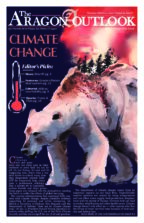

An introspective musical album by 32-year-old rapper NF, “HOPE” was released Thursday, April 6, four years after the release of his album The Search. For many listeners, NF’s past albums were relatable and poignant, capturing struggles with anxiety, depression and perfectionism, but HOPE, a reflection of his personal and professional life, promised and delivered a different tone.
In HOPE, NF continues his lyrical style, which is similar to slam poetry, but he experiments with some different rhythms than the rapid-fire delivery his listeners are used to. Two of his past albums, The Search and Perception, describe how he felt weighed down by conflict and baggage. This album opens up and was announced with the single “HOPE” on Feb. 16. Its theme sets the appropriate tone for the album: it promises recovery from self-doubt. Creatively portraying this “healing process” that NF now delves into, the music video of the single shows him interacting with flashbacks to his past albums.
This theme of recovery continues throughout the album. His second song “MOTTO,” a single released early on March 9, is NF’s critique on the pressures of conformity in the music industry. Throughout his work, NF describes himself as a black sheep, doing his own thing authentically without regard to the opinions of others, so “MOTTO” is a continuation of his past work.
With brilliant rhyming and flow, HOPE’s third track “CAREFUL” returns listeners to the familiar rhythm of NF’s past work. Its lyrics make references to other songs in the album and express his gratitude for where he is in life, adding a sense of cohesion to the theme and style of the album.
In HOPE’s fourth song “MAMA,” NF revolves more of his song around Christian imagery of heaven. His mother died from an overdose in 2009, and she is the subject of lyrics throughout his discography. In past songs like “How Could You Leave Us,” NF expressed frustration that he did not have his mother with him growing up, but in “MAMA,” he forgives his mother, an impressive sign of growth and consistency with the album’s theme of moving on and recovering.
“Its lyrics make references to other songs in the album and express his gratitude for where he is in life, adding a sense of cohesion to the theme and style of the album.”
The third single of the album “HAPPY” describes finding comfort in self-doubt and the struggle of reaching out for help. His lyrics are powerful and poignant, coupled with an uplifting, lively background. The upbeat feel contrasts the darker, more intense beat of “PANDEMONIUM” that follows the song. In “PANDEMONIUM,” NF flaunts his creative lyrics, success and money in the face of critics who said he fell off. It captures his confidence in his skills, continuing the contrast to the self-doubt of “HAPPY.”
“SUFFICE,” the seventh track of the album, details NF’s aspirations for his musical career and his hard work to meet those dreams. His unique approach to the song with his satisfying rhymes and flow make the rather cliché theme of trying your best because you only live once interesting.
The eighth track, “GONE,” is a collaboration with singer-songwriter Julia Michaels, reminiscing on young love and wishing an ex-partner the best. <Despite the, … The lyrics come off shallow, and in the middle of the song, NF experiments with abrupt ups and downs in the beat, which sound out of place and make the song difficult to enjoy.
In “BULLET,” NF declares his devotion to his partner and appreciation that they love each other despite their flaws. While this song has elements of self-deprecation, which is consistent with NF’s introspective style, it is uplifting and continues the optimistic trend of HOPE.
The tenth song of the album, “TURN MY BACK,” has a fast-paced delivery and a tense, yet satisfying rhythm. The title accurately describes the song’s theme, as he describes his desire to turn his back to collaborations because he does not want to change his work to appease a variety of critics. While it may come off as conceited with lines such as “Wanna get the job right, I do it myself,” it continues the theme of “MOTTO” and his self-portrait as the black sheep of artists.
The twelfth song “LET EM PRAY” has a similar aggressive style, describing NF’s confidence in his hard work and his ability to prove his critics wrong. The beat, flow and the lyrics pair beautifully in the chorus, creating a powerful, satisfying feeling.
Between these two pieces is “MISTAKE,” the eleventh track of HOPE, which has an off-putting soft, mellow tone. In it, NF reveals his desire for others’ approval, asking people to judge what he does as opposed to who he is. It contrasts his appearance of self-confidence in “TURN MY BACK” and “LET EM PRAY.” He is both self-critical and self-absorbed, which introduces interesting complexity into the album.
The final track of the album “RUNNING” beautifully ties the album together, coming back to the original theme of choosing recovery. NF declares he is ready to be happy and his desire to break off unhealthy relationships. It generally has a gentle tone and leaves the listener satisfied with strong rhymes and rhythm.
NF’s album HOPE is a surprising change from his past work and a step in a new direction of recovery. It preserves his signature self-analysis, exploring how he sees himself, his professional life and his relationships with others. While some lyrics and rhythms throughout the album feel generic and off, they are generally creative and satisfying, so I would give this album three and a half stars out of five.



